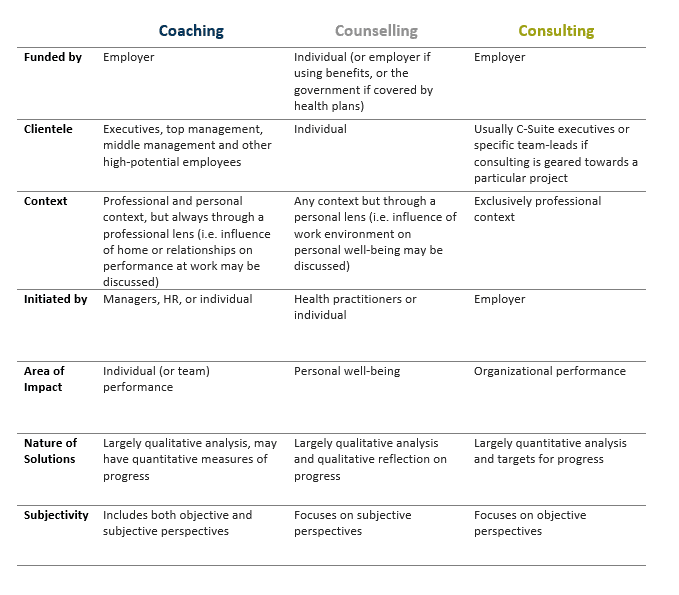Coaching vs. Counselling vs. Consulting
The coaching industry is booming, and yet leaders are often unsure about the nature and role that coaching can play in their organization. This lack of clarity is partially attributable to the fact that coaching is a relatively new phenomenon. Major companies did not use coaching much before the 1980s,[1] but since then the industry has grown to include over 53,000 professional coach practitioners around the world.[2]
Coaching borrows from both the counselling and consulting industries. Unfortunately, that means people often confuse coaching with these two professions. In this blog, we’ll take a look at coaching vs. counselling vs. consulting. We’ll also introduce you to SIGMA’s coaching services and discuss how you can leverage coaching to benefit your team.
The Role of a Coach
In 2009, the Harvard Business Review (HBR) published the results of a study conducted with 140 leading coaches and five subject matter experts.2 They found that the role of coaches has shifted over the years. Commentators and coaches agreed that, at the turn of the century, coaches were primarily engaged to address toxic behavior among business leaders. Today, most coaching focuses on developing the competencies of high-potential employees.
On average, coaching engagements last about 7-12 months and clients are looking for guidance on how to better manage themselves and others. Studies show that what clients value most in their coaches is experience coaching in similar settings, followed by a clear methodology and a high quality clientele.1 The role of a coach is therefore to provide expert advice, establish strategies for improvement, and demonstrate a proven track record.
Interestingly, HBR found that while only 3% of coaches said they are hired to address personal issues, over 75% stated that they assist executives with personal issues at some point during their engagement.3 Subject matter experts commented on this result, saying that while coaching often begins with a business focus, it inevitably migrates to ‘bigger issues’ such as life purpose, work/life balance, and becoming a better leader. In this way, coaching borrows from both counselling and consulting in the role it plays for business leaders.
The Role of a Counsellor
Like coaching, counselling is a service that is becoming increasingly widespread. However, unlike coaches who cater to a professional context, counsellors focus on personal well-being. The top reasons for which patients are referred to counsellors are stress/anxiety, relationship problems, depression, and bereavement. Two thirds of counsellors are employed by district health authorities,[3] demonstrating that counselling also differs from coaching by incorporating a medical or health-related perspective. Because of this medical perspective, clients are often referred to as ‘patients,’ and they are usually recommended to seek counselling by a health practitioner. In comparison, coaching is largely initiated by individuals themselves, or ‘prescribed’ by managers or HR professionals.
The Role of a Consultant
Prior to exploring the role of a coach, HBR investigated the role of a consultant. They interviewed partners and officers of five well-known consulting firms, and established a hierarchy of purposes for consulting services:[4]
- Providing requested information. Consultants are usually hired to answer a particular question.
- Providing a solution. Consultants are usually hired with the expectation that they will deliver a tangible solution (tool, strategy, etc.).
- Conducting diagnosis that may redefine a problem. Rather than answer a particular question, consultants may be hired to diagnose an unidentified issue.
- Providing recommendations. In addition to delivering a solution, consultants are traditionally expected to provide recommendations for implementation.
- Assisting with implementation. Consultants are often hired to monitor and guide the implementation of their recommendations.
- Building consensus and commitment. Consultants help their clients reach a consensus about problems and solutions such that everyone is can commit to assist the implementation.
- Facilitating client learning. Consultants not only deliver solutions but empower their clients by developing new skills (i.e. analysis, communication, leading change)
- Improving organizational effectiveness. The success of a consulting engagement is increasingly being measured by impact, rather than simply by delivery of a ‘solution.’
Traditionally, consulting focuses on purposes 1-5, with purposes 6-8 being additional goals. Interestingly, it’s these additional goals that overlap most clearly with the function of coaching, while the traditional purposes of consulting focus more heavily on quantitative analysis and solutions for improvement.
Coaching at the Crossroads
In a way, coaching lies at the crossroads of counselling and consulting; it takes the function of counselling and provides it in the context of consulting. To help you visualize this interaction, we’ve created a handy chart that allows you to compare coaching vs. counselling vs. consulting:

Looking to Learn More?
Are you interested in learning more about coaching? SIGMA is here to help! Over the last 50 years we’ve worked with more than 8,500 private and public organizations to develop people potential and increase organizational effectiveness. We provide individual and group coaching services, as well as a host of assessments to guide your development efforts. We also offer custom consulting and succession planning services. To learn more about our solutions, contact us directly for more information.
[1] ICF., PWC. (2016). ICF Global Coaching Study. https://coachfederation.org/app/uploads/2017/12/2016ICFGlobalCoachingStudy_ExecutiveSummary-2.pdf.
[2] Coutu, D., Kauffman, C. (2009). What Can Coaches do for You. Harvard Business Review. https://hbr.org/2009/01/what-can-coaches-do-for-you.
[3] Sibbald, B., Addington-Hall, J., Brenneman, D., & Obe, P.F. (1996). The role of counsellors in general practice. A qualitative study. Occas Pap R Coll Gen Pract (74), 1-19. Retrieved from https://www.ncbi.nlm.nih.gov/pmc/articles/PMC2560396/.
[4] Turner, A.N. (1982). Consulting Is More Than Giving Advice. Harvard Business Review. Retrieved from https://hbr.org/1982/09/consulting-is-more-than-giving-advice.